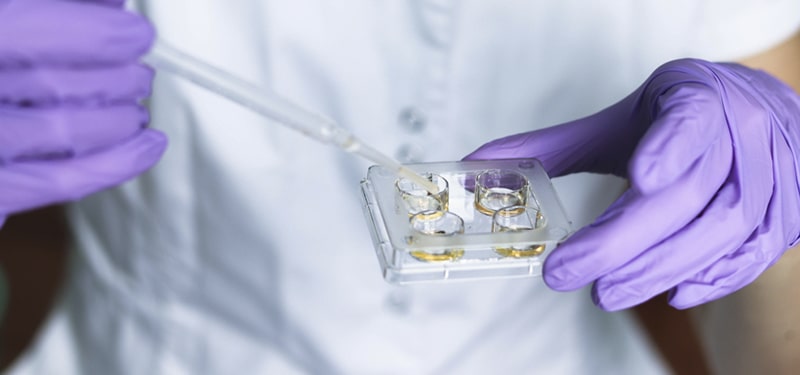According to Dr. Richa Singh Genetic Testing Of Embryos in Lucknow, Forty-one percent of all available embryos developed into blastocysts on day 5. The transfer of at least one good-quality blastocyst could be performed in 62% of patients. Blastocysts had an implantation rate of 26% per embryo, whereas the implantation rate of eight-cell embryos on day 3 was 18%.
Genetic Testing Of Embryos in Lucknow

What is the Genetic Screening Of Embryos?
Over the years, embryo selection has become more important than ever as several studies have shown that as much as 50% of embryos have chromosomal abnormality above the age of 37 years and are likely to fail if implanted into the uterus
With the help of the PGS technique, we can perform an embryo screening for any genetic or chromosomal abnormality before the transfer of the embryos.
These new methods and techniques allow us to select high-quality embryos for transfer thereby reducing the risk of implantation and pregnancy failure. The most common techniques for genetic screening of embryos is PGT or Preimplantation Genetic Testing.
What is PGS?
PGS also is known as PGT, is a screening of chromosomes for aneuploidy. It is used for screening for aneuploidies in embryos. Aneuploidy stands for an abnormal number of chromosomes. The term PGS most often comes in use while discussing infertility with couples who are struggling with issues involving age, repeated IVF failure, recurrent miscarriages, and genetically abnormal pregnancies.
PGS is primarily used for the detection of chromosomally abnormal embryos. The most common technique for PGS is (NGS) Next-Generation Sequencing. This test screens for chromosome syndromes like Down’s Syndrome or Trisomy 21, Trisomy 13, and other chromosomal structural changes.
Indications for PGS testing-
- Repeated IVF failure
- Recurrent miscarriages
- Severe male infertility
- Genetically abnormal pregnancies
Process of PGS-
The procedure is done in three steps. First, the embryos are produced using IVF or ICSI, fertilized embryos are then cultured for 3-5 days. After 3-5 days, embryo biopsy takes place. 2 or more cells are removed after every 3 or 5 days of biopsy for testing. After the cell is biopsied, are placed in test tubes and are sent for further testing. Till then the embryo is frozen and after the test, the embryo is finally transferred into the uterus.
What is PGD?
PGD is a method that allows us to test the embryos of those couples who carry a known risk of genetically inherited disorders. With the help of this method, only the healthy embryos are selected to replace or transfer to the woman’s uterus to achieve pregnancy.
PGD has been very successful in detecting any kind of genetic alterations in the embryos of those who are known to be at risk of passing it on to their offspring. This test helps to identify chromosomally normal embryos for transfer that helps to improve the success rate of IVF.
This test is especially good for those women who have. History of genetic disorder in the family like sickle cell anaemia ,thallesemia ,cystic fibrosis ,haemophilia and many more and allows them to bypass this disease in future generations by opting for this treatment
PGD is performed with the help of a high-powered microscope. One or more cells from the embryo are tested for the genetic train of interest. After this, the unaffected embryos are identified, separated, and transferred into the uterus.
Indications for PGD Testing-
- Abnormal embryos
- Heredity Genetic abnormalities
- Increased risk of chromosome abnormalities
- Severe miscarriage
- Chromosome defect before pregnancy
Process of PGD-
The embryos are first created in a laboratory and are left for 5-6 days for growing. After 5-6 days, a biopsy is done on developing embryos. The embryos are then stored while genetic abnormalities are tested. After all this, the best embryo is selected and then transferred to the uterus.
What is the difference between PGD and PGS?
PGD diagnoses the embryo for a single gene disorder whereas PGS screens embryos for ANEUPLOIDIES and detects chromosomally abnormal embryos.
What are the benefits of PGD and PGS?
- PGD helps couples to pursue biological children which they wouldn’t be able to pursue otherwise
- PGD reduces the risk of conceiving a child with a genetic factor
- PGD can reduce the need for amniocentesis later in pregnancy
FAQs
“A woman can easily walk out of the clinic immediately after having an embryo transfer without facing any difficulties,” According to Dr. Richa for PGS Testing in Lucknow, who was part of the research, physical activities a day after the transfer also helps in reducing stress.
According to Dr. Richa in Lucknow, couples who undergo an IVF/ICSI cycle, where eggs and sperm are injected for fertilization, and from resultant embryos, one or two blastomeres are removed to check the genetic abnormality. Blastomere biopsy is done at 6-8 cell embryos and then tested for any chromosomal abnormality.
In PGD genetic testing, one or two cells are removed from a day-5 embryo and tested for conditions such as cystic fibrosis or sickle cell anemia etc. Used with IVF, this means only those embryos diagnosed as being unaffected or free of a specific disorder will be transferred to a woman. You can visit Dr. Richa clinic for the best treatment and the best cost of pgd testing in Lucknow.
According to Dr. Richa for PGD Testing in Lucknow, PGS improves success rates because chromosomally normal embryos are much more likely to implant and result in pregnancy. Furthermore, PGS also reduces the chances of miscarriage, as the most common cause is a chromosome abnormality.









